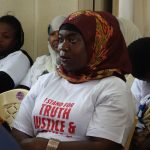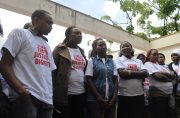Some 47 percent of Kenyan women and girls aged 15-49 have suffered physical or sexual violence, a figure that rises even higher in periods of conflict and upheaval. During widespread violence that ripped through Kenya in the wake of 2007 elections, at least 900 women, girls, men, and boys suffered sexual and gender-based violence. Very few cases were ever prosecuted, fueling a culture of impunity for perpetrators and continued suffering for survivors.
In response, Physicians for Human Rights in 2011 established the Program on Sexual Violence in Conflict Zones, a training and advocacy initiative to help doctors and nurses, police, lawyers, and judges in Kenya and the Democratic Republic of the Congo (DRC) better respond to survivors of sexual violence. The program forges critical alliances among these professionals, empowering them to document cases of sexual violence and to use this evidence to bring perpetrators to justice.
To date, PHR experts and our partners in Kenya have trained thousands of medical, legal, law enforcement, and justice professionals to use forensic science to collect, document, investigate, and prosecute cases of sexual violence. Our Kenya office is supported by a six-member Board of Directors.
In 2013, PHR joined eight survivors of sexual violence committed in the context of the 2007-8 post-election violence and three Kenyan civil society organizations in a landmark case against several offices within the Kenyan government.
The case argues that the State failed to take adequate measures to prevent election-related sexual violence and to protect the victims in the aftermath, including carrying out effective investigations leading to justice and provision of reparations. PHR is taking a leading role in the case, the first ever seeking to hold the government accountable for the election-related sexual violence.
In January 2018, PHR and our Kenyan partners launched our award-winning MediCapt mobile app, which enables doctors, clinical officers, and nurses to collect, store, and securely share forensic medical evidence in cases of sexual violence. MediCapt captures data on a mobile device like a tablet or cell phone, and then uploads it to the cloud, where it can be accessed in a secure and efficient way by other professionals working on the case, such as police, lawyers, and judges.
Watch this video to learn more about our work.






